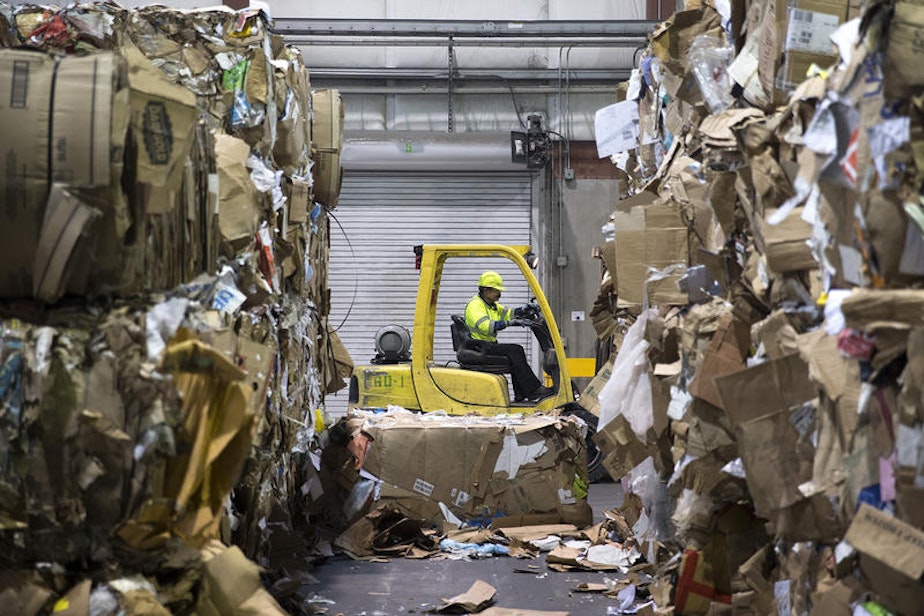You can recycle bottle caps! And Styrofoam! And ...

Do you ever come across an item — bottle caps, Styrofoam — you’re not sure you can recycle? Or did you read the story about China no longer accepting our recyclables and panic?
Elijah Wolfson, science editor at the news outlet Quartz, spoke to Bill Radke about the global economy that trades in cardboard boxes and tin cans — and about China’s new regulations. Wolfson said those of us worried about what will become of our recyclables will just have to wait and see.
“I don’t know if the average person can really do much about this,” Wolfson said. “Ultimately it’s going to be up to Washington state to figure out what it wants to do with this.”
He said one solution might be investing in local recycling operations and infrastructure.
For a perspective on recycling that’s closer to home, Kevin Kelly joined Radke to answer a listener's question submitted to our Local Wonder project. Kelly is general manager of Recology Cleanscapes, a sorting facility in the Georgetown neighborhood of Seattle.
He said Seattle residents recycle or compost about 60 percent of their waste now.
“That’s a very high number and something Seattle and its residents should be proud of,” Kelly said.
But we could be doing better. What about those peanut butter jars we toss in the bin still smeared with peanut butter, for starters?
Kelly said the issue with food waste comes down to contamination. He said food gets on recyclable paper and makes it less durable. Ideally, all recyclables would be clean and dry. But if you can’t do that, it should at least be scraped pretty clean.
“If you have enough peanut butter left in there to make one peanut butter and jelly sandwich, that’s too much,” Kelly said.
Here are a few more recycling tips:
Car seats are made of recyclable material, but they have to be disassembled first. Kelly said he doesn’t know of a local recycler that’s currently accepting car seats, so some research will be required if you’re looking to unload one.
Check with your local regulations about bottle caps. They’re recyclable, but often made of a different type of plastic that has to be sorted separately. Kelly said Seattle residents should reattach the cap and recycle with the bottle.
Those cardboard Amazon boxes you recycle so diligently come with tape attached. But you don’t have to remove the tape before tossing them in the bin. Of course, the fine folks at your local sorting plant will be impressed if you do. It just makes their jobs a little easier.
Glass is accepted in many municipalities, but not all. If you live somewhere that doesn’t accept glass in curbside bins, it’s probably because glass breaks while being transported and then causes damage to equipment. You should look into drop-off locations in your area.
Plastic bags are recyclable. But there’s a big problem: They wrap around equipment and shut machines down. So if you want to recycle your plastic bags, bag the bags. (Meaning put all your bags into one bag, then tie it up.) That way it can be sorted efficiently.
You don’t have to remove the labels from jars (though you can if you really want to). But sorters will take care of it if you don’t.
Styrofoam is recyclable, just not in your curbside bin. You can take it to a drop-off center like Kent-based Styrofoam Recycle where it will be compressed and eventually used to make items such as eyeglass frames.
Recycling is important, but Kelly said it’s still best to reduce consumption and reuse items whenever possible. Listen to the whole segment to learn more — and to see how Kelly won $15 off Radke in a conversation about his own recycling behavior.
Produced for the web by Amy Rolph.

